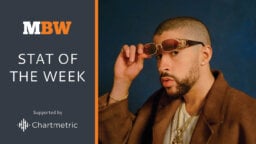MBW’s Inspiring Women series profiles female executives who have risen through the ranks of the business, highlighting their career journey – from their professional breakthrough to the senior responsibilities they now fulfill. Inspiring Women is supported by Ingrooves Music Group.
As CEO and co-founder of branding and live booking company MTW Agency, Diana Dotel has a front-row seat to some of the most exciting developments in today’s music business.
As a proud Latino, Dotel is focused on finding opportunities and recognition for Latin music talent — once a niche genre that’s firmly landed in mainstream culture with streaming growth outpacing the overall music market in the US, according to RIAA figures.
As Dotel explains further in our interview below, this mission requires a lot of patience to educate brands about the nuances within Latin America, which covers more than 20 nations with an overall population of over 680 million.
As part of her work in branding, Dotel has witnessed another transformation over the last year with brands moving further into the music space as artists become more open than ever before to alternative revenue earning opportunities beyond touring during the COVID-19 pandemic.
As a result, MTW Agency has been busy brokering deals between the likes of Becky G and Amazon for her own podcast, En La Sala, Doja Cat and IPSY, G-Eazy and Puma and Maluma and Michelob Ultra. Last year alone, MTW organised six sponsored livestream performances and Dotel is planning another for International Women’s Day in March.
Dotel founded MTW in 2018 alongside her co-CEO Matt Ferrigno following over 10 years working as a promoter. She got into the music industry after being inspired by her father, Jose Wakamba, who worked in music marketing, and together they launched promoter Wakamba Entertainment.
Their first show was a festival featuring eight Latin artists at the Arthur Ashe tennis stadium in Queens, New York, which is where Dotel’s future was set. “I was just enamoured and after that show, which was a very successful concert, that’s when I knew this is what I wanted to do.”
At Wakamba, Dotel got thrown into the deep end as the competent English speaker of the two, taking care of promo, PR, ticketing, advertising, visas and travel. Through working with her Dad, she tells us she learned how to fight for the artist and follow her heart.
“I lead with passion and I fight for what artists deserve, whether it’s monetary compensation or visibility.”
“I got my passion from my dad, he had a lot of passion for the genre and the artists. I follow my heart in everything and even today with brands, if there is a lot of educating that I have to do on behalf of the artist, I lead with passion and I fight for what they deserve, whether it’s monetary compensation or visibility.”
Dotel also counts late veteran Latin music promoter Ralph Mercado, who was the first co-promoter she worked with, as one of her mentors who helped her hone her organisation skills. “Ralph gave me the organisation skills my dad didn’t have — he was pretty buttoned up. He would just tell me, ‘You’ve just got to do it and you can do it’. He was very encouraging and would walk me through some processes as I was at the start of my career.”
Here, we chat to Dotel about the future of music and branding, livestreaming beyond Covid, inequality for Latin music artists and lessons learned across her career.
Aside from what you learned from your dad and Ralph Mercado, were there any bigger lessons you learned from your fifteen years in the live music business that help you today?
You have to wear many hats, there is no job too small or too big, it’s always ‘all hands on deck’ in the live space. I have never been working a show where something doesn’t fall through the cracks or there isn’t a craziness happening and you have to learn how to shift roles really quickly. It’s all about managing, directing, orchestrating and being resourceful.
One minute you could be writing the cheques, signing the deals, but you are never too important to go and get coffee or order food — you have to do whatever is needed at the time to create a successful event.
What’s the secret to a successful music and brand partnership?
It’s all about collaboration. It’s a people’s business, it’s not like software, it’s about collaborating with the artist and team and the same is for the brand execs as well, it’s just about the partnership and understanding what both sides are looking for.
Do you have any advice when it comes to looking for the right fit for an artist?
It works both ways and because our company is pretty unique, I have represented the artist and I have also represented the brand. If I’m working with the artist, I get to know the artist and I think that’s the most important thing.
When artists approach us and say, ‘Hey, I want to get into branding’, the first thing I ask is, ‘What are your interests?’ That’s how we go create — we say, ‘Okay, great, they love wearing sunglasses’, for example, and then we’ll try to make that happen for them.
The same thing goes for the brand — they have their boxes that they need to check, there is a demographic target they want to hit, so we’ll go looking for the artist that makes sense for the brand.
What impact is the pandemic having on live music and brand deals?
It’s absolutely changed and it will never be the same. What we all realised is that there is a lot that we can do from home or remotely, as far as performance goes and the live music space. Obviously post Covid everyone is going to want to go to a concert, that’s always going to be there, but I think a lot of it is going to be more tech-driven in future.
“live music will never be the same. What we’ve all realised is that there is a lot that we can do from home or remotely — I think a lot of it is going to be more tech-driven in future.”
As far as brands go, brands are starting to realise the value of artists more than ever since this hit, it’s like the marriage has been complete. Every artist is now looking for brands, which they normally wouldn’t because they were afraid of being associated or too gimmicky, but now they are welcoming it and seeing that there are different ways to promote their music.
It’s only going to keep growing and there will be innovation in how brands and artists partner. For example, Travis Scott doing the virtual concert with Fortnite last year was huge, he’s not the first but he made it mainstream to do so. The relationship will continue evolving and brands will need A level artists and even more than artists will need them.
How do you think that livestreaming is going to evolve, especially when in-person music shows can return?
The floodgates have opened. It’s been really interesting to see what some of these pre-recorded shows were able to do. With Maluma, we did a Michelob Ultra livestream performance where he was on the beach on a little island off of Miami and it was just spectacular — everybody was sitting at home wondering, ‘Where is he and where did they film that?’. We’ve seen Nicky Jam on a boat or Bad Bunny on the top of a tour bus running around from the Bronx to Manhattan.
With technology, these performances get more clever and it’s something that a live festival or venue can’t do so I think that it’s here to stay. The timing on when it airs will just be more strategic. We are all consuming TV by computer and streaming so I think this [pandemic has brought about the] opportunity for the streaming and live space to grow.
As you know, Latin music has exploded globally over the past few years. From where you’re sitting, what are the reasons behind that and how do you see the industry evolving moving forward?
The rise of Latin music could be because of the increase of Latinos living in America — we are the fastest growing population and no longer the minority. Music plays an important role in the Latin community’s expression and identity and has given Latinx a new sense of pride in their heritage and identity, especially because Latin music has modernised.
Generation Z are becoming more ethnically diverse and the best-educated generation, so whether it’s pop, trap, rap, Latin music… it’s all rising and making its presence in US music genres. Because of that rising popularity in mainstream media, listening to Latin music is no longer something culturally obscure, you now have mainstream artists crossing over and collaborating with Latin artists, like The Weeknd singing in Spanish with Maluma.
“latin music is here to stay — it’s not going to be a trend.”
We have been here before in 2005, when there was Beyoncé, Shakira and Enrique Iglesias singing in English, and it kind of died out, but I think with social media and the factors I mentioned before, the genre is here to stay and it’s not going to be a trend.
What’s the most challenging thing about working with Latin music?
It’s a very male-dominated industry, for one, and I would say the lack of community as well. We’ve wanted to become visible for so long that everybody wants a seat at the table and there’s no community but without that, we can’t keep increasing the genre.
The most challenging thing when working with brands and Latin music is the education process. So them not knowing the consumer or the complexity, the nuance or diversity from East to West Coast, and the difference between a Latinx person from the Caribbean versus Colombia, Venezuela, that has definitely been challenging and requires a lot of education.
“Latinos are not a ‘one size fits all’. A lot of brands or companies want to put them in one box but we are not all the same. We are vibrant, unique and culturally diverse.”
Latinos are not a ‘one size fits all’ at all. A lot of brands or companies want to put them in one box but we are not all the same. We are vibrant, unique, culturally diverse, and brands need to understand that if it’s not a tailored approach and if you don’t want to understand that, it will affect your bottom line, for sure.
You have one shot to get it right — if brands are not aware of the differences and nuances, they kind of miss the mark and end up with one of those campaigns that are kind of cringey and stereotypical that us as a community frown upon. Educating and knowing the difference is so important.
Do you see the male-dominated nature of the industry having an impact on the success of female artists?
Yes, there is a lot of history of male executives not giving female artists opportunities because they thought that it wouldn’t work. Some of the women in Latin music, although they have the same streaming numbers as their male Latin counterparts, have never been able to tour in the US. They go to Europe and South America but no one has believed in them to actually do their tour in the US, which is insane to me. They deserve the same opportunities, they work hard and they put out good music.
The managers are like, ‘No-one is going to support that’ but that’s kind of incorrect because data shows that 80% of the ticket-holders for Latin shows are female. But now that Latin has crossover, I think big corporations like Live Nation or AEG will start looking at these female artists because they think differently, but there’s been no interest from Latin independent promoters.
Also, I definitely see a gender pay gap in all factors, whether it’s advancing for label deals, touring or branding, it’s not the same. Hopefully we can repair that sooner rather than later.
How do you cut through in the male-dominated world? Have you learnt any strategies to make sure that you’re taken as seriously as your male counterparts?
It’s difficult because Latin culture is very male-dominated generally, it’s been a cultural thing for years and years so you can’t really change that. What you can do is own the room, speak up, know what you’re talking about, never apologise and use your expertise. You have to have a thick skin and can’t let that issue affect you. It’s about having tunnel vision, staying focused and not letting something that’s beyond you culturally affect you.
What would you change about the music industry and why?
I wouldn’t change anything – it’s very flawed but those flaws are what create opportunity to disrupt and create your own path. When I was in the live space solely, how I got into branding was frustration — I would see sponsorship for general artists and I would pitch or try to get sponsorship for my [Latin music] shows and the budgets were so different, so small.
That was frustrating to me because we contribute so much — I would have an artist that would play 52 markets and do tours that were on Pollstar pulling the same numbers as general market artists so why don’t we have the same opportunities? You can see someone as big as the artists we have now in Latin music who are pulling the same streaming numbers, the same viewership, everything is the same, and their branding deals or their touring deals are not the same [as non-Latin artists].
“You see someone as big as the artists we have now in Latin music who are pulling the same streaming numbers, the same viewership, everything is the same [as non-Latin artists], but their branding deals or touring deals are not the same.”
Bad Bunny is the No.1 global artist right now so it’s not because of language. If we can be right there and be equals, then it should be equal all across the board. There are so many artists coming up that are pulling so many incredible numbers and they are not getting the recognition they deserve. But although flaws are bothersome, it gives people the opportunity to disrupt and create your own path, and I’m a prime example of that.
What are your future plans and ambitions?
I want to continue expanding into production and keep creating now that I have that relationship with Amazon and HBO. I also want to continue working in production and creating movies and documentaries about Latin music and culture that would help people understand us more and our nuances and leave an imprint of our story and history. I’m actually working on a docuseries now that’s about empowering women from the Latin music scene. I also want to continue to even the playing field with brands and Latin artists and ensure that we do have a seat at the table.
What advice would you give to a younger version of yourself?
You can and you will. There is going to be a lot of distractions, it’s going to be a journey, you’ll have times that you are going to want to give up and you’ll hear ‘you can’t do that, you are a girl’ constantly and I allowed some of those words to push me back. Luckily, I pushed through it but if I had 100% tunnel vision I think I would have gotten here way sooner.





